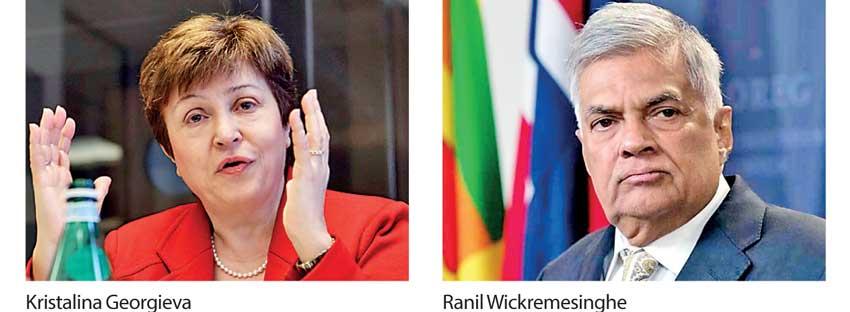Reply To:
Name - Reply Comment

Prime Minister Ranil Wickremesinghe in his capacity as the Finance Minister has requested International Monetary Fund (IMF) Managing Director Kristalina Georgieva Tuesday evening to expedite the process of staff-level agreement, which would then pave the way for the rescue package at least by September.
After the former managers of the economy pushed the Sri Lankan economy into a precipice in early March, after exhausting all its remaining official reserves, officials have been scrambling to find dollars to meet the country’s basic needs such as food, fuel, medicine and fertiliser.
After stubbornly refusing for two years, Sri Lanka is now compelled to engage with the IMF for a rescue package in the style of an Extended Fund Facility, where any bailout money is tied to tough austerity and serious reforms in the fiscal and state sectors, where inefficiency is rife.
While Sri Lanka is looking for about US $ 3.0 billion from the IMF, any money will come in multiple tranches within a period of at least three years. However, any deal with the IMF will reopen avenues for the country to access other multilateral and bilateral funds, by way of bridge financing.
“I spoke to the Managing Director (of the IMF) and requested help to expedite this process as we need bridging finance,” Wickremesinghe said, indicating that bridge financing is contingent on an agreement with the IMF.
“I will do my best to push this forward and to ensure that we can get finance by September at the latest,” he assured.
While Sri Lanka is fast running out of cash for fuel and coal under the prevailing Indian credit line in a matter of weeks, Wickremesinghe said except for India, no other country or multilateral agency supports Sri Lanka to buy fuel and coal, although they may provide humanitarian assistance in areas of food, medicine and fertiliser.
Therefore, he requested from everyone in both sides of the isle as well as from the agitators on the roads not to create any mayhem, which would cause a complete cessation of assistance from the rest of the world.
“Every time we ask for help, what they often come back and say is, you first help yourself and then we will help you,” he said paraphrasing what he may often hear from foreign partners when he engages in negotiations for funds.
“I will tell you one thing; you hold placards, protest and engage in struggles. We have no problem with that. But please do not engage in such practices in a manner which destabilise the country again,” he said in a likely reference to the May 9 incidents, which dealt a severe blow to the country’s reputation on the world stage.